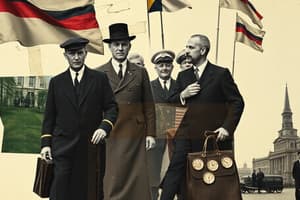Podcast
Questions and Answers
What was a significant characteristic of the Reichstag during the Weimar Republic?
What was a significant characteristic of the Reichstag during the Weimar Republic?
- It had significant power over the military.
- It was completely democratic.
- It lacked significant power. (correct)
- It controlled the police force.
How did World War I affect the psychological state of Germans?
How did World War I affect the psychological state of Germans?
- It created feelings of bitterness and anger. (correct)
- It had no significant effects.
- It led to greater unity and obedience.
- It strengthened their ambitions.
Which group had limited influence in the political process during the Weimar Republic?
Which group had limited influence in the political process during the Weimar Republic?
- The working class and middle class. (correct)
- The military leadership.
- Foreign diplomats.
- Wealthy industrialists.
What was one of the weaknesses of the Weimar Republic related to proportional representation?
What was one of the weaknesses of the Weimar Republic related to proportional representation?
What controversial measure allowed the German president to bypass parliament during emergencies?
What controversial measure allowed the German president to bypass parliament during emergencies?
What element contributed to the political instability in post-war Germany?
What element contributed to the political instability in post-war Germany?
In terms of suffrage, how did the Weimar Republic compare to Britain?
In terms of suffrage, how did the Weimar Republic compare to Britain?
Which aspect contributed to the lack of trust in the Weimar government?
Which aspect contributed to the lack of trust in the Weimar government?
What was one strength of the Weimar Republic related to its legislative process?
What was one strength of the Weimar Republic related to its legislative process?
Which factor indicated a rising authoritarian trend in the Weimar government?
Which factor indicated a rising authoritarian trend in the Weimar government?
Flashcards are hidden until you start studying
Study Notes
Political Effects of the Weimar Republic
- The Reichstag, Germany's parliament, lacked power.
- Working class and middle class lacked influence in the political process.
- The German government became a military dictatorship, with little opposition.
- There was no effective opposition to the Kaiser, which contributed to the rise of military dictatorship.
Psychological Effects of the Weimar Republic
- Germans had high expectations before the war.
- Wartime experiences and the outcome of the war led to widespread disillusionment and resentment.
- The devastating impact of the war destroyed feelings of unity and obedience.
- Prior to the war, Germans were recognized for their shared nationalism and unity.
Anarchy in Post-War Germany
- Post-war Germany experienced political and social instability.
- Soldiers returning from the war contributed to the unrest.
- Rioting and demonstrations against the Kaiser contributed to the instability.
Strengths of the Weimar Republic
- Proportional Representation (PR) ensured that every vote contributed to democratic representation.
- Men and women over 20 could vote.
- The Chancellor needed support from the Reichstag for the government to function.
- A strong President was necessary to control the government during crises.
- The army was an important element of Germany's government.
Weaknesses of the Weimar Republic
- Proportional Representation (PR) led to many parties in the government, making it difficult to set policies and make decisions.
- Political divisions existed regarding how the government should function, with liberal views debated.
- People questioned the government's legitimacy and effectiveness.
- Confusion existed concerning who held political authority.
- The army, influenced by a leader seeking the Kaiser's restoration, held significant power.
- Article 48, a controversial clause, allowed the president to make autocratic decisions by bypassing the parliament during emergencies.
Studying That Suits You
Use AI to generate personalized quizzes and flashcards to suit your learning preferences.




